There are a few different things a scripted television show can do to keep you tuning in. The most obvious — and one that’s gained significant favor in recent years — is serialization, the idea that anything that happens one week will potentially affect the next episode, and even episodes that won’t air until years later. Breaking Bad obviously was a high-profile example of this, and one that kept juggling as many looming tragedies as it could from the very start. Pretty much any prestige drama qualifies.
Another thing you can do is create a world, or a set of characters, that viewers want to spend time with. It’s not the storyline that keeps someone coming back so much as it is the chance to escape into that little universe. This is something Friends, Cheers, and similar shows did quite well. Very little of the appeal was due to longform story telling; it owed more to the chance to be part of that environment, even passively. Most sitcoms fit into this slot, with, of course, varying degrees of success.
Then you have the kind of show that cycles through a set of topics, with audiences tuning in weekly to see how the characters will deal with whatever compartmentalized conflict or development is explored next. This is an approach primarily suited to crime procedurals, such as CSI or Law & Order, medical dramas like ER or House, and high-concept sitcoms like Third Rock From the Sun or even Gilligan’s Island. The framework is a kind of machinery through which a piece of input is fed and processed, and the joy comes from watching the disparate moving pieces come together.
Of course, most shows are actually combinations of the above. Certainly all of the best ones are. Monk, for instance, had a huge amount of option three, but wouldn’t have been nearly the same show if not for its central character bringing along a lot of option two. The Venture Bros. is mainly option one, but also relies heavily, and increasingly, on option two. Futurama was one of the most natural combinations of two and three I’ve ever seen. M*A*S*H* combined all three, and is rightly remembered as one of the finest American programs period.
You get the idea. Shows that do one thing well are worth watching, usually. Shows that do two or more things well are relatively rare, but nearly always memorable for it.
ALF is entirely option three. This isn’t a bad thing. Not all shows need to grasp for several rings, and it’s by no means to anyone’s detriment if one decides, instead, to dig more deeply into a singular approach, and work on refining that. It can make the show feel a bit predictable, but it doesn’t have to feel any less fun.
The problem is that ALF doesn’t so much cycle through these different situations as it does pick them from a list, willy-nilly, with no care given to which topics have already been covered and should probably be scratched out. That’s why season one had three episodes (in a row) about ALF being in love. It had two episodes revolving around a Tanner birthday…with each of them implying that it was ALF’s first experience of how they’re celebrated on Earth.
And now we have another episode where ALF leaves a note and disappears into the outside world, with nobody knowing where he is. Originally, that was “Looking For Lucky.” Now it’s “Wedding Bell Blues.” I’d be perfectly happy to expunge the former from my memory in favor of the latter, but it’s really no better.
Yeah, I’m just babbling in general here, but you can’t blame me too much for that. This is probably the single blandest episode of ALF yet.
It opens with ALF being pissed off that nobody’s put him on a stamp, then he reveals that he ate Willie’s dinner and forged a bunch of checks. Willie makes the face above and the curtain is lifted on another masterpiece.
When the episode proper begins, we see Brian being fitted for a Friar Tuck costume. He’s in another play, so I wonder if Willie’s going to be required by the school to write a song about Nottingham.
ALF says that there was a Robin Hood on Melmac, too…but it was just some guy who robbed the hoods off of people’s cars. Ho ho. It’s lame, but I guess it’s better than the Melmacian version of Don Quixote, who was identical for some reason to Earth’s Don Quixote.
Lynn is working on a family tree project for school, which is better suited to someone in Brian’s grade than in hers. Why would that be a high school project? Is she in special ed classes? I can’t wait for the episode in which she has to make a hand-print turkey before graduation.
This would actually be a great opportunity for the show to flesh out some detail about the Tanner family tree, what with everyone talking about the Tanner family tree. Shockingly — and yet, not — we learn nothing we don’t already know. The only member of the extended family mentioned by name is Dorothy…aka Kate Sr. ALF jokes that she should be represented by a nut instead of a branch, and that’s pretty much that.
Wouldn’t this have been a nice chance to learn something, such as anything, about Willie’s parents? Kate’s father? The kids’ aunts and uncles?
Kate suggests that ALF stop bothering everyone and go do his own family tree. He can’t remember much, though, apart from the fact that his father was always breaking things and his mother sat around all day eating. Kate replies, “It’s a miracle you turned out so well,” and I’m reminded of just how fortunate we are to have Anne Schedeen on this show. Honestly. Every so often the writers come up with a line that’s worth delivering, and I’m beyond glad that we have one member of the cast that’s capable of delivering it.
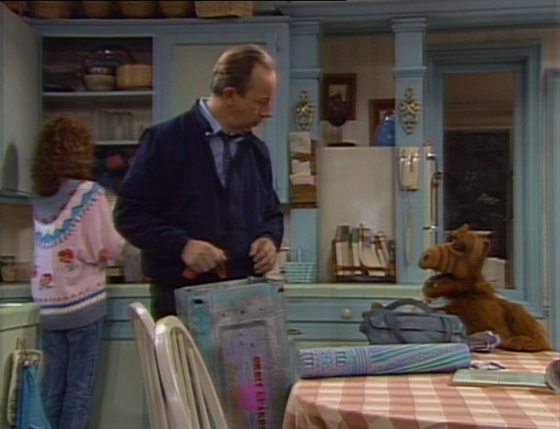 In the next scene Willie is carrying ALF’s luggage in from the space ship, and he makes a joke about ALF crashing because he exceeded the weight limit. If you think I’m exaggerating the value of Anne Schedeen’s line deliveries, just listen to Max Wright’s here.
In the next scene Willie is carrying ALF’s luggage in from the space ship, and he makes a joke about ALF crashing because he exceeded the weight limit. If you think I’m exaggerating the value of Anne Schedeen’s line deliveries, just listen to Max Wright’s here.
And, yeah, you know what I’m about to say: they’re just now pulling the luggage out of the fucking space ship? How is this even possible?
Last season, the ship crashed. Fine. It was disassembled and stripped for parts in “Baby, You Can Drive My Car,” then reassembled at some point, I guess. In “The Gambler” it was loaned out to a film crew, and “La Cuckaracha” was built around the idea that ALF just cleaned out his ship and let a spaceroach loose in the house. Through all of that, the luggage was left inside? I know we’ve already established that serialization is not ALF‘s forte, but that’s beyond preposterous.
The worst part, though, is the question of just how ALF managed to take so much luggage with him. Didn’t Melmac explode unexpectedly? And wasn’t he in the Orbit Guard? Instead of assisting the rest of the Guard in handling the catastrophe and helping others evacuate, he just flew his ship back to his house and loaded up all his personal shit? What an asshole. All of the kids on Melmac are dead because ALF didn’t want to leave his snowglobes behind?
The fact that he hasn’t pulled any of the luggage out in over a year makes it pretty clear he didn’t really even want this stuff…and yet it was still more valuable to him than the lives of his family, girlfriend, neighbors, colleagues, fellow guardsmen, and friends.
The luggage even has ORBIT GUARD stenciled onto it. Nice attention to detail, I admit, but this means he used government property, while on duty, to haul away his own possessions instead of making any attempt to do his job.
Maybe Melmac exploded because ALF didn’t pitch in to help with the situation. I’m sure the show would never make that clear, but wouldn’t it be just perfect if the whole fucking civilization was blown apart because ALF’s a shittyass selfish dick?
Willie pulls out the green fuzzy dice that ALF gave to Brian in “Help Me, Rhonda” and which we saw again in “The Gambler,” ALF having apparently slugged the kid in the balls and taken the gift back.
This is the third time we’re seeing them. I guess when the ALF crew pays the props department to dip some fuzzy dice in green dye, they make sure to get their money’s worth.
There are also some old photos that ALF flips through. We don’t get to see them, which is the second time this episode seems to go out of its way to have an organic reason to flesh out some backstory, and then provides absolutely none. One photo reveals an embarrassing truth to ALF, though: his parents were wed on the 12th of Twangle, but he wasn’t born until the 28th of Nathanganger. That means that, tragically, ALF was born in wedlock.
That’s actually a very cute twist on the situation, and I like it quite a lot. But I’m not sure a realization like this makes any sense the way it’s presented. Obviously ALF knows his own birthday, so does this imply that his parents never once mentioned the date on which they were married? How is he only putting this together now?
Also, is that one of the mugs from the flashback in “Help Me, Rhonda”? Funny that they’d show us that and expect us to remember it as an authentic Melmacian drinking vessel (and totally not something they found on the shelf at Dollar General) but won’t show us a single picture of all the aliens ALF misses so much…who ALF could have saved if he wasn’t so busy saving pictures of them instead.
Anyway, ALF runs off crying, and Willie and Kate walk through the halls, following the sound to their own bedroom. The camera stays with them, navigating around corners and such, and that’s very uncommon for a sitcom with a basic, fixed set like this one. Unlike the nice visual work of the pilot and a few other episodes, all this sequence does is remind us of why cameras don’t do this in sitcoms. It looks, in a word, artless. And kind of shoddy. But I will absolutely give them credit for trying. That’s so much more than they usually do.
Kate and Willie enter their room and try to console the weeping alien, emphasizing that it’s pretty silly to be embarrassed about being born in wedlock. ALF makes a very welcome and valid point, chastising them for expecting that the entire universe would follow the same moral code.
That’s kind of a sharp observation, and one worthy of exploration, so of course it turns into a joke about Don Knotts.
Fucking fuck this.
They fail to cheer ALF up, so they decide to sleep on the sofa bed that night and let ALF have their room. If they have a sofa bed, why the hell didn’t they set it up for the Mexican kid in “Border Song”? Of course the fact that they also made him sleep in his clothes kind of answers that.
They leave and then ALF goes over to the window to ponder his situation. He sees Mrs. Ochmonek getting undressed and the big joke, I guess, is that he had to look at an old lady’s flappy tits.
The next morning Willie and Kate go into the kitchen. The refrigerator is empty, so Kate says it looks like ALF had his breakfast. That’s a reasonable enough joke, but then Willie says, without a trace of humor, “At least he didn’t eat the tape recorder.”
What an effortless way of drawing the audience’s attention to a prop on the table, there, ALF.
They find a note ALF left, which says that he’s gone and that they should play the tape for further information.
There’s absolutely no reason for there to be both a note and a tape, except to pad out the episode. Seriously, we’re halfway through this shit and this is the first thing that’s happened. Though I guess having a tape does mean Paul Fusco gets to have his voice in this scene, thereby taking more lines away from Max Wright.
Something tells me watching those two men interact for a half hour would be infinitely funnier than watching their characters do it.
Anyway, ALF’s gone and they have no idea where he is, so…
Oh. Oh fuck no.
Oh fuck no.
OH
FUCK
NO
He turns up at a monastery and says, “I hear you’re looking for a few good monks.”
God. Fucking. Christ.
Willie keeps replaying the tape, trying to listen for clues as to where ALF might have gone. See why a note would have been better from a narrative perspective? That would have been much more natural for a character to pore over, and we wouldn’t have to listen to the tape over and over again along with him.
The tape is especially useless since the clues end up being in the words, and not in the background noise or anything. In The Life Aquatic, Team Zissou is able to identify the whereabouts of someone who’s been abducted by listening not to what he says, but to the sounds around him as he says them.
In that case, an audio recording made sense; a note wouldn’t have conveyed the important information. Here, the note could have conveyed the only important information, which is some vague phrasework that Lynn remembers from a brochure that came in the mail.
There are two decent moments in this scene, though. For starters, Brian asks Willie why ALF ran away, and Willie says he’ll understand when he’s older. When Brian asks how old, Willie replies, “Older than me. I’m still trying to figure it out.”
Talking of text vs. speech, this is a punchline that doesn’t play well in print, but works very well when spoken. It’s one of the few times that a line’s improved by having a naturally nervous, befuddled actor like Max Wright deliver it.
Then, after Lynn finds the brochure and they realize ALF’s gone to a monastery, Willie looks up and says, “I’m sorry.”
It’s funny, and I’m impressed that they didn’t ruin it by having someone ask, “Who are you talking to?” to which Willie would reply, “I am speaking to God, who lives up in the sky, so I’m looking upward, toward the sky, while I apologize to Him for ALF joining the monastery, because I don’t believe he would be a very good fit.”
The monastery is full of blind retards.
Seriously, his hands aren’t even covered. Why did they bother setting up the Friar Tuck costume? It doesn’t make him look any more human at all. In fact it just draws attention to how clearly inhuman he is. His nose sticks out of the hood for shit’s sake.
The monks are a silent order, which of course leads to a lengthy and unfunny sequence with ALF babbling endlessly about how cool he is with the fact that he’s not allowed to talk.
The episode overtly suggests that this is why ALF is safe from having his secrets exposed: they can’t tell anyone they saw an alien.
But think about it…what’s to keep these monks from thinking he’s a demon or something? He’s clearly not human. What if they locked him up or hauled him off somewhere or started to worship him? Any of that would have made for a better story than this, in which everybody does nothing.
This whole setup really does only work if they’re blind.
Willie shows up, of course, and he starts gushing to ALF about how smoking hot his mom was.
I’m not even kidding; Willie brags bizarrely about his own mother being a babe, and pulls out a picture to prove it.
Jesus Christ. That’s the last time I complain about wanting to hear more about Willie’s family.
Anyway, the point of the story is not that baby Willie thought his mom was good enough for a poke, but that he was very disappointed to discover that his mom wore a wig. So, maybe ALF’s parents hid their dirty little secret to protect him from feeling like that.
Then ALF makes a joke about the monks not being allowed to fuck women, and the monks leave.
So, who wants these DVDs when I’m done with them?
ALF takes his hood off, and, yes, I know the monks left, and, yes, I know they can’t talk, but are ALF and Willie really comfortable enough for ALF to strip naked in public?
Who cares if they can’t talk? Can’t the monks still write a letter to somebody, saying that there’s a fucking alien in town? And, seriously, wouldn’t the simple fact of seeing this creature throw their entire worldviews into turmoil? Like Mrs. Ochomonek’s televised alien pow-wow from last week, this isn’t the sort of thing you witness first hand and then slip immediately back into a normal life in which you never mention it again.
Oh, who am I kidding. Something would actually have to happen in these episodes if the writers thought about any of this.
“Wedding Bell Blues” is just an endless series of circular conversations. The central conflict is a decent one with a funny twist, but it goes nowhere. It’s not terrible, but it’s wall to wall bland.
Of course, being only “bland” means this is easily within the ten best episodes of ALF ever made.
ALF is so moved by Willie’s speech of wanting to have wild sex with his bald mother that he decides to go back home, which he shouts to the monks in the next room. The monks all cheer.
Okay, that’s kind of funny, but then ALF says, “I thought this was a silent order!!!!!!” and fucking hell we really were lucky Willie’s apology to God wasn’t explained, weren’t we?
And if the monks are not silent anymore, shouldn’t there be some major panic on the parts of Willie and ALF that they made no effort to hide the fact that the new monk was an alien, and indeed spoke about it openly while the monks were fondling grapes or whatever the hell the writers think monks do?
Whatever. Who cares. The episode’s over. Everyone fucks around and eats cookies.
The biggest disappointment is the fact that Mr. Ochmonek is listed in the end credits, but he wasn’t actually in the episode.
I guess his scene was cut before broadcast. That’s a shame, because the odds are pretty fucking good that he would have been the highlight of the entire episode.
MELMAC FACTS: On Melmac the worst stigma imaginable is being born in wedlock. Newlyweds feed each other a piece of the wedding cat. And all of the months are called hilarious things like Twangle and Nathanganger.
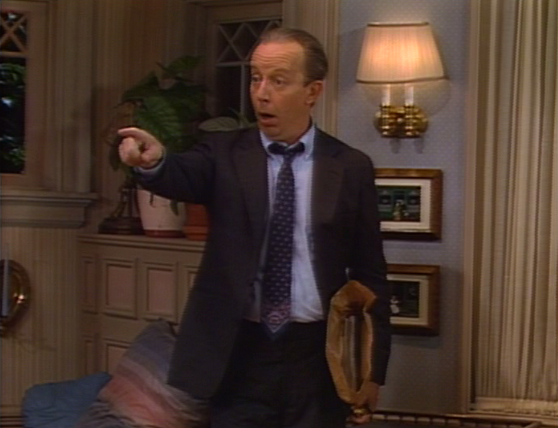
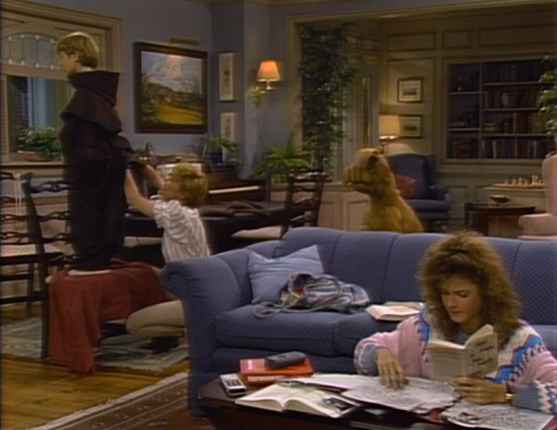
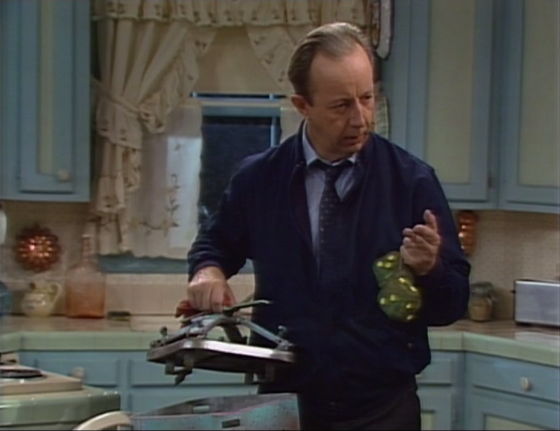
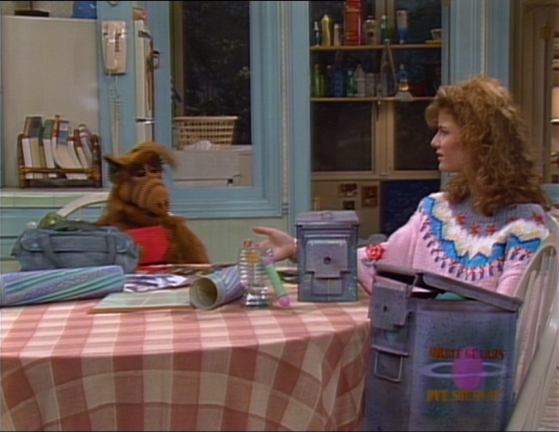
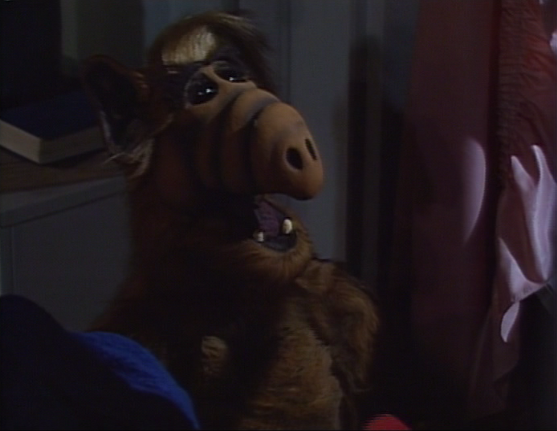
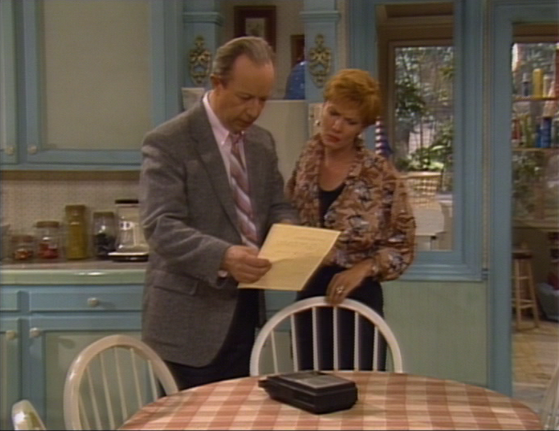
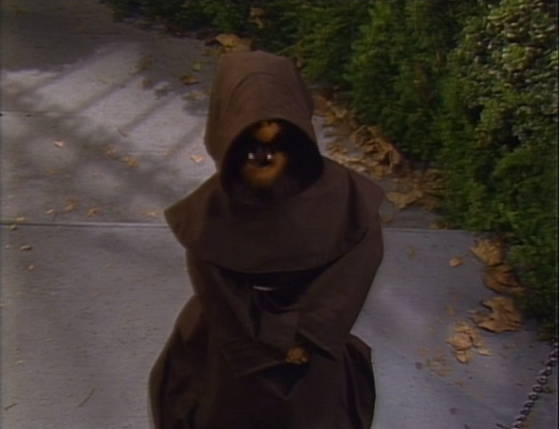
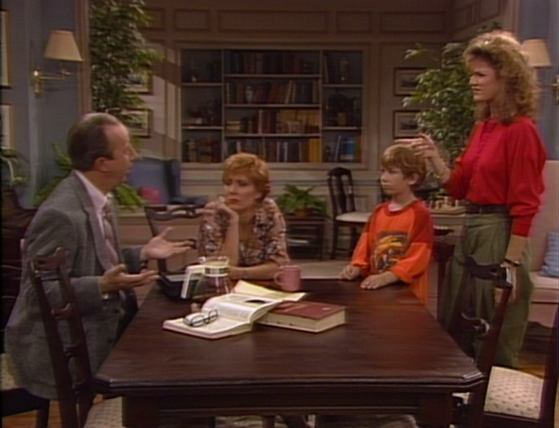
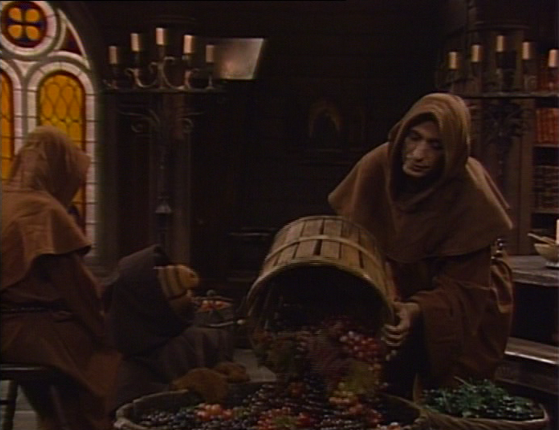
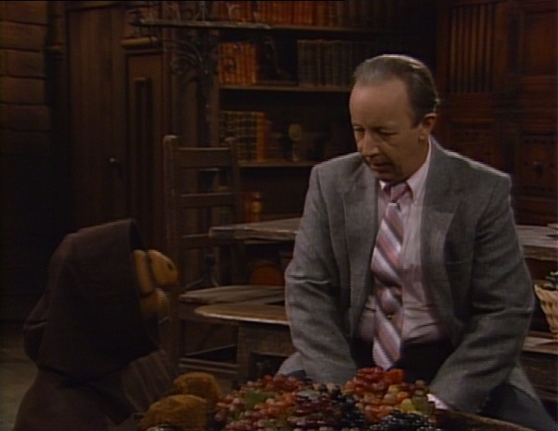
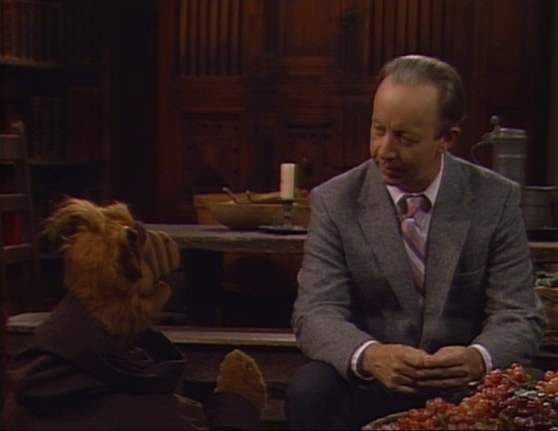
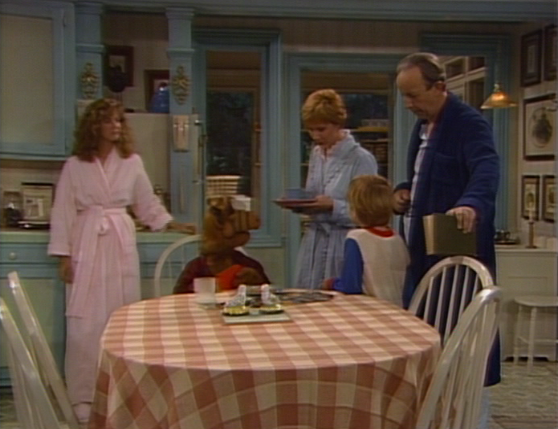
“M*A*S*H* combined all three, and is rightly remembered as one of the finest American programs period.” – Now you’re talking! THIS is the stuff I can agree with, right there! I love M*A*S*H from the hilarious early episodes to the heavy handed, maudlin later episodes. Pretty much every single episode.
–
Your “three reasons for tuning back in” is very astute. I don’t know if I’d quite lum the crime procedurals/medical dramas into three, myself. More 2, since you’re coming back to the same basic place, to spend time with the characters, in their world. Their world consisting of medical emergencies, crime scenes, and the ensuing drama/complications. I think 3 is actually far more rare than the other two, mostly because it’s probably harder to write and also isn’t what “sells” sight now, in a sea of Breaking Bads, Houses of Cards and Games of Thrones. Serialisation is where it’s at.
–
But I would probably put shows like Star Trek, Stargate, even (dare I say it) MacGyver into number 3, since while you do have a set world, and a set of characters, the situations and stories being told are far more diverse and wide ranging. I heard a quote which I can’t remember, but it was discussing the fact that in previous decades, you’d turn on something like MacGyver and you wouldn’t know what you’d get that week. Would he be fighting commandos in a jungle? Helping a prostitute get away from her pimp? Stopping East Germans from getting a hold of secret stockpiles of gold? Investigating suspected aliens? (Those are all real MacGyver plots, btw) And the same goes for Star Trek. Tropes aside, you could have a wide range of stories about a wide variety of topics. Holodeck going haywire was, of course, done every season of Next Gen, DS9 and Voyager, but they were usually somewhat different stories. Sure, everything went back to the way it was by the end of the episode, but you’d learnt something along the way. And some episodes would be funny. Some serious. Some with action and others without a single punch thrown or laser fired. But each episode of CSI is going to be a crime drama and you can almost set your watch to the timing of the “big moments” since all the stories are ostensibly the same. Hence you keep coming back because you like those particular characters. MORE two than three, but with a bit of both. Maybe?
–
I’m guessing that “monster of the week” kind of show was better for a syndacation heavy style programming whereas now with DVDs, Netflix and digital recorders, and the rise of binge-watching, the “self contained episode” has died away. This means more serialised stories and less “monster of the week” stories. Its also the rise of more shows like South Park, where almost every episode is made by a relatively small, “core” group. Venture Bros can grow every episode, despite often nothing particularly much happening, because the writers write all the other episodes too, and can put the growth and changes into the lives of the characters. I recently finished Rick and Morty, and while it has a little bit of continuity, the really amazing part is how the ideas seem to grow out from each episode. Going deeper, getting darker, and this can only be done by the small team.
–
This is very apparent in anime as well. In Japanese animation, if a show is adapted from a manga (which is usually published weekly and written by one main dude) then it can be a slowly growing, steadily building story (think of Bleach or Death Note), but original anime either have a fixed story to tell and do it (like Evangelion) or have episode after episode of simple, often boring, “filler” with only occasional elements of continuity (think of Pokemon or Digimon). The manga is the small team while the anime is the big team. And it’s MOST obvious when an anime catches up to the publication schedule of the manga itself and has to spin its wheels, usually by having a “filler arc” where nothing can happen or change so as not to contradict the “actual canon” (being the original manga).
I agree with your categorizing Star Trek as a three, but I feel like it has some 2 as well. Though it didn’t happen every single week, they usually picked something topical to explore by way of science fiction (and got away with it, because, you know, it was “fiction” and “the future”). I don’t feel like it was quite as evident in Voyager, but most definitely in TOS, Next Gen, and DS9.
“So, who wants these DVDs when I’m done with them?”
–
I do! Not only do I have a strange (and quite embarrassing) desire to see these episodes uncut one day, but additionally it would be awesome owning the DVD set you used to create all these incredible reviews. :-)
Zod dammit, Phil. Now I find myself sorting other shows like sorting outside characters into Hogwarts houses.
I’m sorting ALF into Number 4, Privet Drive.
So…what’s the deal with the title?
yeah, I can agree this episode was kind of blend, nothing overly special or funny happens in it, the biggest funny thing that happens in this episode is ALF dresses like a monk. I also agree I found very odd that all of suddenly we see ALF with a shit load of language from his spaceship, the fact we just now seeing it and how the hell he manged to get all of that on ship before his planet blew up? also can agree that it is very odd when he joins the monastery, the monks just let him right in and don’t question his appearance in the slightest, they don’t think he some kind of demon or anything. I guess they are openly accepting aliens into their order now. I did like the moral of the story, that no matter what dark secrets your parents may hide, they still love you, but meh,I guess it got muddled again my obscure silliness
This is easily one of the worst episodes (yet you list it as one of the best, hu? Unless you’re being sarcastic.) ALF joining the monastery makes zero sense and their reactions to him, even less.